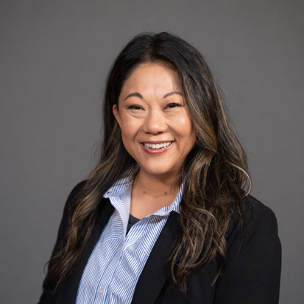Student Spotlight

Kari Kalgren
Executive Director, Strategy & Innovation , Premier Inc.
Residence: North Carolina, USA Nationality: USA
Class of 2025
In her role as Executive Director of Strategy and Innovation for the research, data, and analytics arm of Premier Inc., Kari Kalgren has a broad remit. Her role involves leveraging technology, real-world evidence, advanced research methodologies, and cutting-edge AI tools—such as clinical decision support and natural language processing—to drive studies that improve quality and patient care. “It’s a space where innovation meets collaboration, and every day feels like an opportunity to make a tangible impact,” she said.
A South Korean native who was raised in rural South Dakota, in her current role Kalgren routinely delves into areas from population health, value-based care, and health equity in an effort to meet global policies around data collection and clinical trials. For instance, she helped develop a data ontology that facilitated the use of natural language processing (NLP) to predict patients at risk of developing Alzheimer’s disease from both structured and unstructured data elements in their health records, potentially enabling early intervention to both slow the disease’s progression and identify potential candidates for clinical trials.
Kalgren had been exploring master’s programs for years when she discovered the NYU MSHLS program. “I had never found a program that truly resonated enough for me to commit, but this program isn’t a traditional master’s like an MBA or MPH—it’s a thoughtful blend of health law, policy, equity, economics, and strategy, which are areas I’m deeply passionate about and work on every day. Plus it was practical, relevant, and something I could complete within a year while still balancing my professional and personal responsibilities.
“The program has been incredibly helpful, particularly as it relates to understanding how policies, reimbursement models, and quality measures influence healthcare at every level. These frameworks, while well-intended, often create unintended challenges, and the program has equipped me with the tools to think critically about potential solutions.
“For me, the greatest strengths are the interdisciplinary orientation and the diversity of experiences within the cohort. The program doesn’t just focus on high-level strategy—it dives into real-world examples of how policy, reimbursement, and quality measures, while designed to drive improvement, can also create operational and financial challenges.
“The cohort itself has been an incredible asset. Learning from professionals across industries and geographies has broadened my understanding of how different healthcare systems approach similar issues. It’s been fascinating to see how U.S. and global systems grapple with challenges like data ownership, technology implementation, ensuring access to care for all patients, reimbursement models, and quality metrics, and it has expanded how I think about tackling these issues strategically in my own work.
“What we’re learning is already helping me refine my understanding of the broader policy and reimbursement landscape and how these frameworks create both opportunities and challenges. It’s given me a stronger foundation to approach issues like quality measures and incentives, which often have well-intended goals but can lead to unintended consequences. Learning from real-world examples throughout the cohort has provided me with new perspectives on how to design more balanced and effective solutions or how we think about generating evidence to assess cost effectiveness.
“Additionally, the program has challenged me to think critically about my own assumptions. The global comparisons and deep dives into the constitutional and legal underpinnings of healthcare have reshaped how I view the U.S. system and its complexities. It’s not about simply adopting another model or relying solely on market forces—it requires thoughtful, strategic approaches that take into account policy, reimbursement, and patient-centered outcomes. This program is helping me refine those skills and positioning me to lead meaningful change in the industry.”
